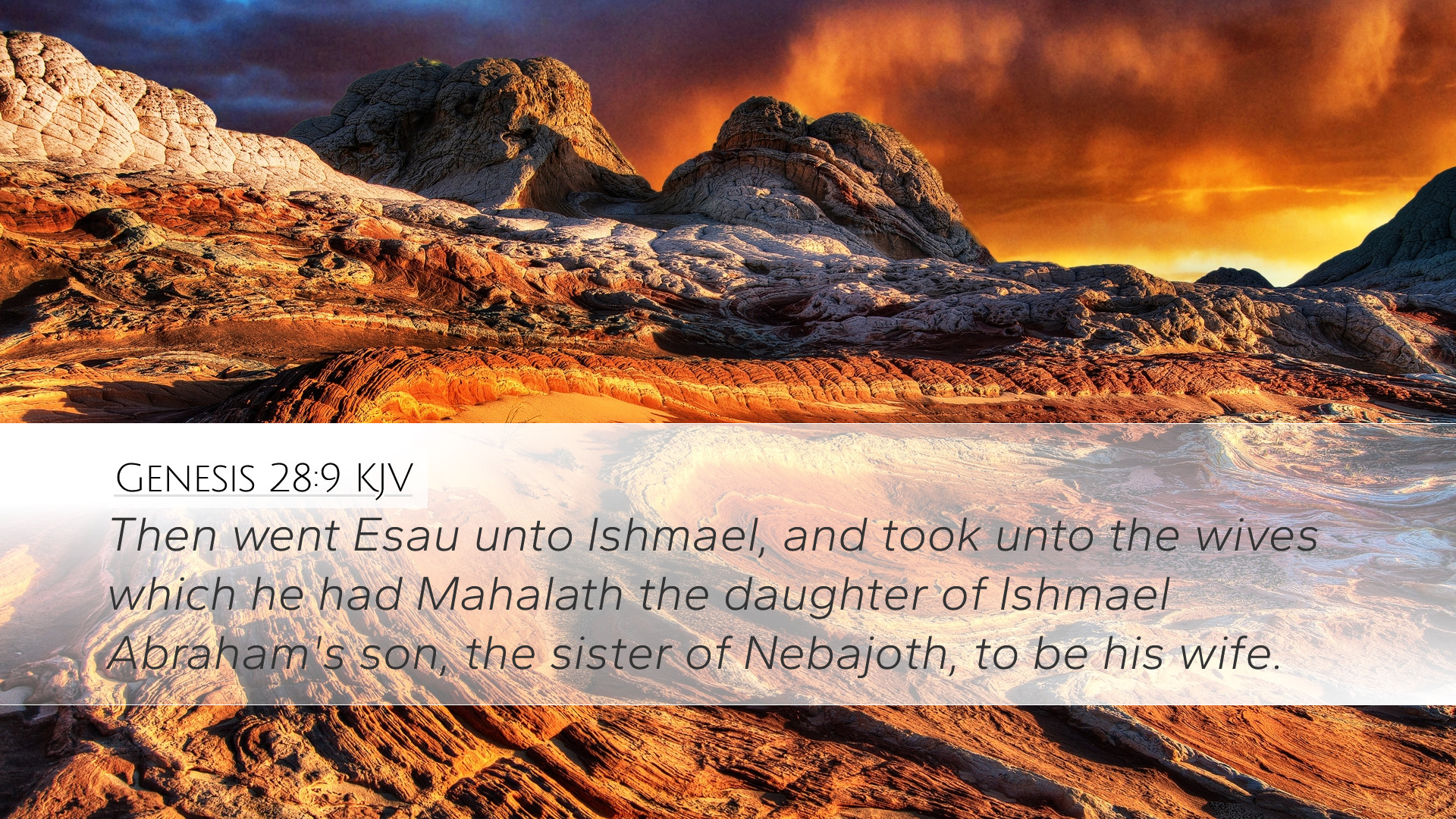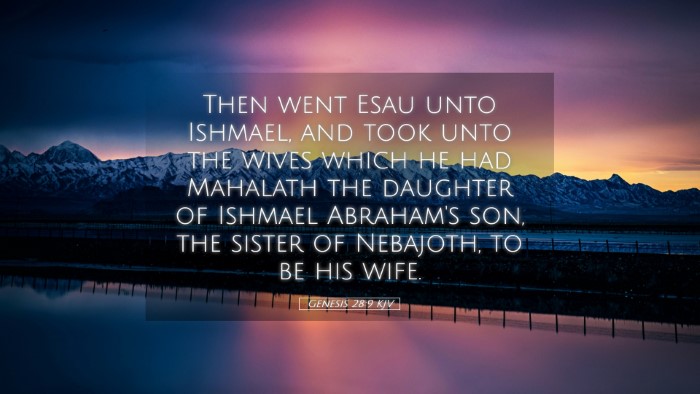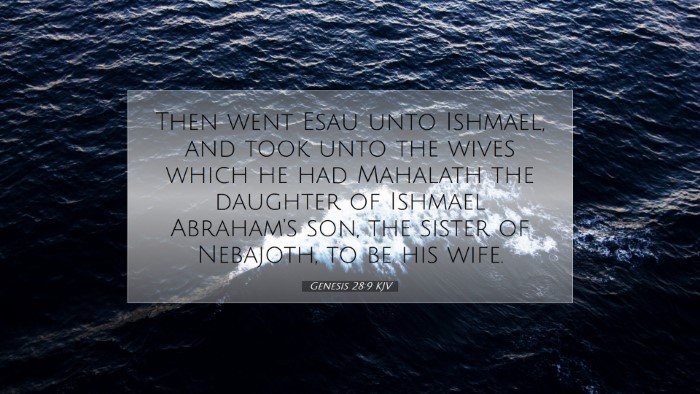Commentary on Genesis 28:9
Verse Context: Genesis 28:9 states, "So Esau went to Ishmael and took Machalath the daughter of Ishmael, Abraham's son, the sister of Nebajoth, to be his wife in addition to the wives he had." This verse marks a significant moment in the narrative of Jacob and Esau, showcasing Esau's decision to seek a wife from the lineage of Ishmael, which amplifies the ongoing saga of familial and covenantal tensions within the Abrahamic line.
Insights from Public Domain Commentaries
Matthew Henry’s Commentary
Matthew Henry provides an in-depth analysis of Esau’s actions, noting that his marriage to the daughter of Ishmael reveals a departure from the covenantal lineage which Abraham established. Esau's decision can be seen as a misguided attempt to enrich his family ties following the loss of his father’s blessing to Jacob.
- Context of Marriage: Henry emphasizes that Esau’s choice reflects his misunderstanding of God’s covenant. Whereas Jacob was positioned as the heir of the promise, Esau's alliances continue to demonstrate a pattern of disregarding the spiritual heritage associated with the Abrahamic family.
- Family Discord: The act of marrying outside the covenant custom symbolizes the ongoing strife between the two brothers, emphasizing the fulfillment of God’s prophecy about the conflict between their descendants as seen later in Genesis.
- Repercussions: Henry also points out that the choice of spouse is pivotal in Scriptural narrative. Esau’s marrying of Ishmael’s descendant signifies a rejection of God’s covenant and, subsequently, sets the stage for further divisions within the family structure.
Albert Barnes’ Notes on the Bible
Albert Barnes elaborates more on the cultural implications of Esau's choice, suggesting that by marrying into Ishmael’s family, Esau was trying to affirm his own status and mitigate the loss he felt after Jacob’s deception.
- Cultural Significance: Barnes highlights that intermarriage with the Ishmaelites shows a disconnection from the divine promise. This act indicates a preference for the worldly over the spiritual, which is detrimental to the generational blessings intended for Abraham’s lineage.
- Pursuit of Acceptance: Esau's decision illustrates a desire for validation outside the covenant family—seeking recognition through connections rather than through divine favor. This misguided pursuit leads him further away from his rightful place within the inheritance Jacob has received.
- Division of the Lineage: Barnes underlines the eventual consequence of such unions, pointing toward the broader theme of estrangement that occurs not only within families but also within nations that diverge from God’s intended plan.
Adam Clarke’s Commentary
Adam Clarke takes a reflective approach to Esau’s actions, emphasizing the spiritual blindness inherent in his choices. Clarke suggests that by marrying Machalath, Esau not only chose a partner but also rejected the path that God had laid out for his family.
- Spiritual Blindness: Clarke notes that Esau’s choice underscores a lack of spiritual discernment. It is a representation of an individual operating outside the boundaries of divine guidance, seeking what is physically appealing rather than what is spiritually directed.
- Rejection of Heritage: Clarke stresses the gravity of Esau's marriage to an Ishmaelite, which essentially casts aside the legacy of the covenant. He illustrates how this act reflects Esau’s inherent disregard for the blessings associated with his father Isaac and the God of Abraham.
- Future Consequences: Clarke’s commentary leads the reader to consider the broader implications: relationships forged outside of God’s design have long-lasting consequences that affect not only individual destinies but also the trajectory of nations.
Theological Reflections
Genesis 28:9 stands as a crucial pivot in understanding the conflict between Jacob and Esau. Each brother represents contrasting approaches to God’s calling and blessing. Esau’s choice forces the reader to engage with deeper theological questions regarding fidelity to God versus the allure of worldly stature and relationships.
- Covenantal Fidelity: This verse serves as a poignant reminder of the importance of aligning personal choices with God’s plans. Esau’s decision starkly contrasts with the intentional path of Jacob, setting the stage for future redemptive narratives.
- Implications for Ministry: For pastors and theologians, the insights gleaned from this verse can inform discussions on community, relationship, and spiritual inheritance. The consequences of marital decisions and relational choices echo into the lives that follow, drawing attention to the need for discernment in guidance and mentoring.
- Lessons on Legacy: For students of the Word, the commentary reminds us that our choices impact not just ourselves but extend to generations beyond. The narrative serves as both a warning and a lesson on the importance of remaining within the boundaries set by the divine will.
Conclusion
This exploration of Genesis 28:9 through the lenses of respected public domain commentaries reveals the depth and breadth of the implications within this seemingly simple verse. The actions of Esau invite a critical examination of one’s allegiance to God’s covenant and the consequences of our choices in relation to it. As such, this passage provides rich content for preaching, teaching, and personal reflection on the nature of divine blessing and the pursuit of God’s intended plans.


